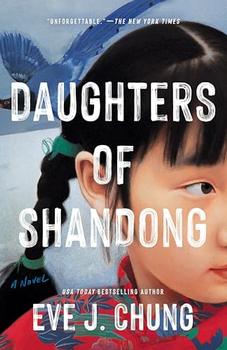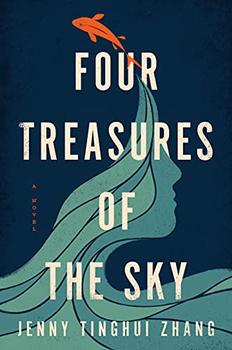Summary | Excerpt | Reading Guide | Discuss | Reviews | Beyond the book | Read-Alikes | Genres & Themes | Author Bio

A propulsive, extraordinary novel about a mother and her daughters' harrowing escape to Taiwan as the Communist revolution sweeps through China, by debut author Eve J. Chung, based on her family story.
Daughters are the Ang family's curse.
In 1948, civil war ravages the Chinese countryside, but in rural Shandong, the wealthy, landowning Angs are more concerned with their lack of an heir. Hai is the eldest of four girls and spends her days looking after her sisters. Headstrong Di, who is just a year younger, learns to hide in plain sight, and their mother—abused by the family for failing to birth a boy—finds her own small acts of rebellion in the kitchen. As the Communist army closes in on their town, the rest of the prosperous household flees, leaving behind the girls and their mother because they view them as useless mouths to feed.
Without an Ang male to punish, the land-seizing cadres choose Hai, as the eldest child, to stand trial for her family's crimes. She barely survives their brutality. Realizing the worst is yet to come, the women plan their escape. Starving and penniless but resourceful, they forge travel permits and embark on a thousand-mile journey to confront the family that abandoned them.
From the countryside to the bustling city of Qingdao, and onward to British Hong Kong and eventually Taiwan, they witness the changing tide of a nation and the plight of multitudes caught in the wake of revolution. But with the loss of their home and the life they've known also comes new freedom—to take hold of their fate, to shake free of the bonds of their gender, and to claim their own story.
Told in assured, evocative prose, with impeccably drawn characters, Daughters of Shandong is a hopeful, powerful story about the resilience of women in war; the enduring love between mothers, daughters, and sisters; and the sacrifices made to lift up future generations.
A mother and three daughters are left behind when the more powerful members of their Nationalist family flee to escape Communists during the revolution. The story is told from the perspective of the oldest daughter, Li Hai, and the author does an astonishing job of capturing the thoughts of an adolescent girl dealing with both inconceivable trauma and everyday concerns (Kathleen L). If a book taking place during a war can be called enjoyable, this is it. I say enjoyable based on the mother/daughter relationships, the three-dimensional characters and the rising above the circumstances, which almost makes the reader forget the horrors in favor of the power of the storyline (Marie M). Chung's writing is descriptive without being overly expansive. Daughters of Shandong was a real pleasure to read and I hope Chung continues to write (Laurie B)...continued
Full Review
 (632 words)
(632 words)
(Reviewed by First Impressions Reviewers).
 Eve J. Chung's debut novel Daughters of Shandong focuses on the mother and daughters of a landowning family who flee China for Taiwan as a result of the Communist revolution in the late 1940s. Chung has spoken about how she was motivated to write the book by her maternal grandmother's experiences of that period of history.
Eve J. Chung's debut novel Daughters of Shandong focuses on the mother and daughters of a landowning family who flee China for Taiwan as a result of the Communist revolution in the late 1940s. Chung has spoken about how she was motivated to write the book by her maternal grandmother's experiences of that period of history.
However, what became a work of fiction started as a simple attempt to record her family's past. In a note to readers, Chung portrays the special relationship she formed with her grandmother from having lived with her in Taiwan as a child. While they were close, bonding over competitive billiards and period dramas, Chung knew little of her grandmother's history as a refugee. After her grandmother passed away in ...

If you liked Daughters of Shandong, try these:

by Jenny Tinghui Zhang
Published 2022
A propulsive and dazzling debut novel set against the backdrop of the Chinese Exclusion Act, about a Chinese girl fighting to claim her place in the 1880s American West.

by Nguyen Phan Que Mai
Published 2021
Winner of the 2020 BookBrowse Debut Award
The Mountains Sing tells an enveloping, multi-generational tale of the Trần family, set against the backdrop of the Việt Nam War. "Both vast in scope and intimate in its telling ... Moving and riveting." - Viet Thanh Nguyen, author of The Sympathizer, winner of the Pulitzer Prize